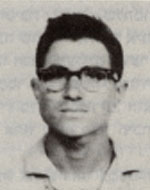Peleg (Falek) and Yigal
Yigal, son of Esther and Naphtali, was born on November 3, 1950 in Kfar Haroeh. He studied at the elementary school in Kfar HaRoeh, where he continued his studies at the Bnei Akiva Yeshiva, in a humanistic direction. He was by nature an idealist who not only spoke of ideals and Zionism, but actually fulfilled them. In his behavior he could serve as a symbol of adherence to values, and he had extraordinary simplicity and kindness. Yigal was drafted into the IDF at the end of July 1968, and as a member of the Nachshon Moshavi group, he was posted to the paratroop brigade. After basic training and after completing his training course, he was stationed as a liaison in a Nahal unit and later in a paratroop battalion. He had taken a parachuting course, but since his leg was broken and his medical profile was lowered, he was transferred from a course of squadrons and his battalion and assigned to the platoon in Makhula. After completing his regular service, he was assigned to reserve duty as a liaison in the Paratroopers Brigade. When the outpost of Mehola in the Jordan Valley became a permanent civilian settlement, Yigal joined it as a member and became one of the moshav’s founders and pillars. Yigal worked in the vegetable garden as the irrigation supervisor. He was always in work clothes and worked devotedly, regardless of working hours. Even when he limped because of a fracture in his leg, he ran and ran irrigation lines throughout the working hours. In 1972 he married a wife and the couple set up their home in Mula. Thanks to his interest in agriculture, the agriculture decided to allow him to study at the Faculty of Agriculture of the Hebrew University in Rehovot, and he completed his first year studies. When the Yom Kippur War broke out, Yigal was called to his unit. He was sent with his battalion to the Sinai and fought in the braking battles. He then moved to the western side of the Suez Canal and took part in the battle for the city of Suez. On October 25, 1973, the day after the cease-fire went into effect, his force, which fought on the Serag-Barrel axis, was forced to take control of the junction at the outskirts of the city. In the battle, Yigal was hit by a bullet in his chest and killed. He was brought to rest at the cemetery in Kfar Haroeh, where he left behind a wife, parents, two sisters and a brother, and after being killed he was promoted to the rank of corporal. His role in faith. He was a soldier in the Paratroopers Unit, which is a volunteer unit, and it seems to me that this trait of volunteering and charisma was a strong character trait. Go ahead, go first – whether it is paratroopers in the military sector, or to the civilian sector. One of the positive things that influenced his friends – whom he was very fond of – was his faith in his path. “The members of his family and the moshav of Mehola planted a memorial in his memory, The Hebrew University of Jerusalem published a pamphlet entitled “Nizkor”, in memory of its fallen soldiers in the war, and also included articles about it: The Faculty of Agriculture in Rehovot published a pamphlet entitled “In Memory of Them” Of Emek Hefer, and in the Bulletin of the Beit Shean Valley Regional Council, in which the names of their fallen soldiers are recorded in the Yom Kippur War Kippur.
